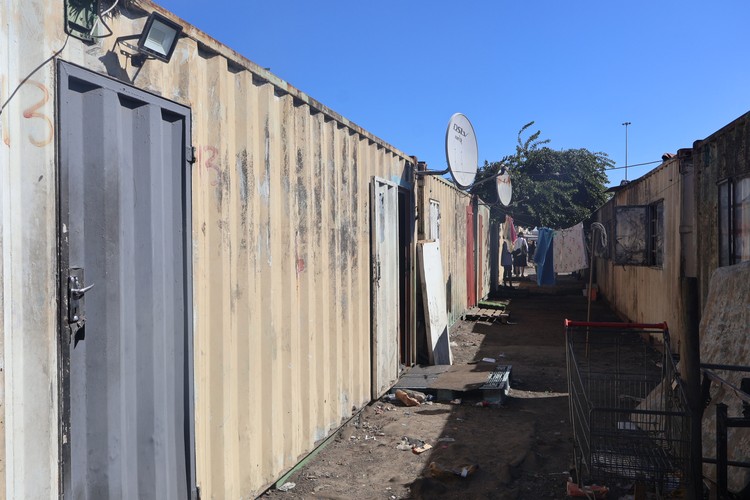
29 April 2025
People were moved to these shipping containers and a neighbouring dilapidated apartheid-era hostel in Langa more than two decades ago. They say they’ve been waiting years for proper housing. Photos: Yaseen Bardien
People living in shipping containers and a neighbouring dilapidated apartheid-era hostel in Langa say they’ve been waiting decades for proper housing.
Last month, scores of residents who live in temporary relocation areas and apartheid-era hostels in Langa marched to the Cape Town Civic Centre to demand clarity on who is to benefit from a planned housing development in their ward.
We recently visited the area and spoke to people who say they are tired of waiting for the local government to fulfil its promises.
Lerotholi Avenue was a hive of activity, with a carwash and other informal vendors. On the same street is a large building decorated with brightly coloured murals painted in 2023. This building stands in contrast to the dilapidated, grey rusted rows of shipping containers nearby with illegal electricity cables hanging overhead between a nearby hostel and shipping containers.
One container is divided by what looks like thin cardboard sheets, to separate the space inside shared by two families.
Nomsa Lawu shares her half of the shipping container, mostly filled by a double bed, with her husband and three children. Lawu, like the other residents living in the shipping containers, was moved to the temporary relocation area by the City of Cape Town in 2002.
Nomsa Lawu, like the other residents there, moved into the shipping container in 2002 from New Flats hostels with the understanding that it would only be for a few months.
She said their move from the New Flats hostel was meant to be for three months, but 23 years later they are still there with no indication on when they will be moved. Langa’s New Flats hostel is in a poor condition and getting worse.
“There is no electricity here, so we have resorted to illegal connections from the hostel nearby. We must pay R200 a month for the electricity, sometimes we don’t even have money because my husband and I are unemployed. And if we don’t pay then the electricity gets cut off,” said Lawu.
She said living in the tiny space was unbearable. “Our children must sleep on a mattress on the floor. When someone baths, some of us either have to go outside, or we all sit on the bed so the person bathing can use the floor space.”
Lawu’s neighbour, Welekazi Mbele, was also moved there from New Flats in 2002. She shares her container with three other family members. “I have to tie my windows with pieces of plastic because they do not close properly. I can’t even put a carpet on the floor because this container becomes moldy because it leaks when it rains,” she said.
“There were flats built in Nkandla a few years ago, I was sure we would benefit but nothing. We have been forgotten,” said Mbele.
Ward councillor Lwazi Phakade showed GroundUp to a container where a fire broke out three weeks ago, destroying most of the family’s belongings. Despite the strong smell of charred plastic, Phakade pointed to the bed and clothes and explained that people still lived there because they had nowhere else to go.
The Old Beer Hall was painted in 2023 when Langa celebrated its centenary. But the conditions of people living inside have remained unchanged for years.
Next door is the Old Beer Hall built for workers during apartheid but is now home to many families sharing dormitory-style rooms. “People use different things like wardrobes as partitions for their rooms. Eight to ten people share one small room. There’s no privacy,” said Old Beer Hall resident Yanga Kotani.
Outside the building are more makeshift rooms next to the building’s six toilets. Kotani explained that only two of the toilets and three taps work. “We clean and fix the blocked toilets ourselves. But these toilets now need to be replaced. They can’t be fixed. The taps as well, as you can see, are broken,” said Kotani.
Carl Pophaim, the City’s mayco member for human settlements, confirmed that the families currently living in the shipping containers and the Old Beer Hall were moved to these areas from the New Flats hostels. “These residents form part of the ongoing Langa redevelopment plan. The City is working on a Langa redevelopment plan which includes the hostels. Affected stakeholders are being engaged by the Directorate on a way forward on the redevelopment of Langa,” he said.
Pophaim said the availability of funding is the City’s main challenge for projects. “Discussions with the Western Cape Government and the National Department of Human Settlements, regarding the provision of funding for future projects, are ongoing,” said Pophaim.
But the Langa’s ward councillor doesn’t believe this to be true.
Phakade told GroundUp that most of the residents are in the dark about a “redevelopment plan”.
“If there was a real plan, it would have been implemented by now. The living conditions of the people in the Langa temporary relocation areas is diabolical and no one deserves to live in those conditions,” said Phakade.
When asked specific questions about the future of Langa’s temporary relocation areas, Pophaim said there were a number of such areas in communities like Dunoon, Mitchells Plain, Gugulethu and Khayelitsha. “Temporary relocation areas are also known as incremental development areas and are parcels of land that have been developed for families in need of emergency housing, for as long as their emergency lasts,” said Pophaim.
Five family members live in the tiny space inside the shipping container which is mostly taken up by their bed.